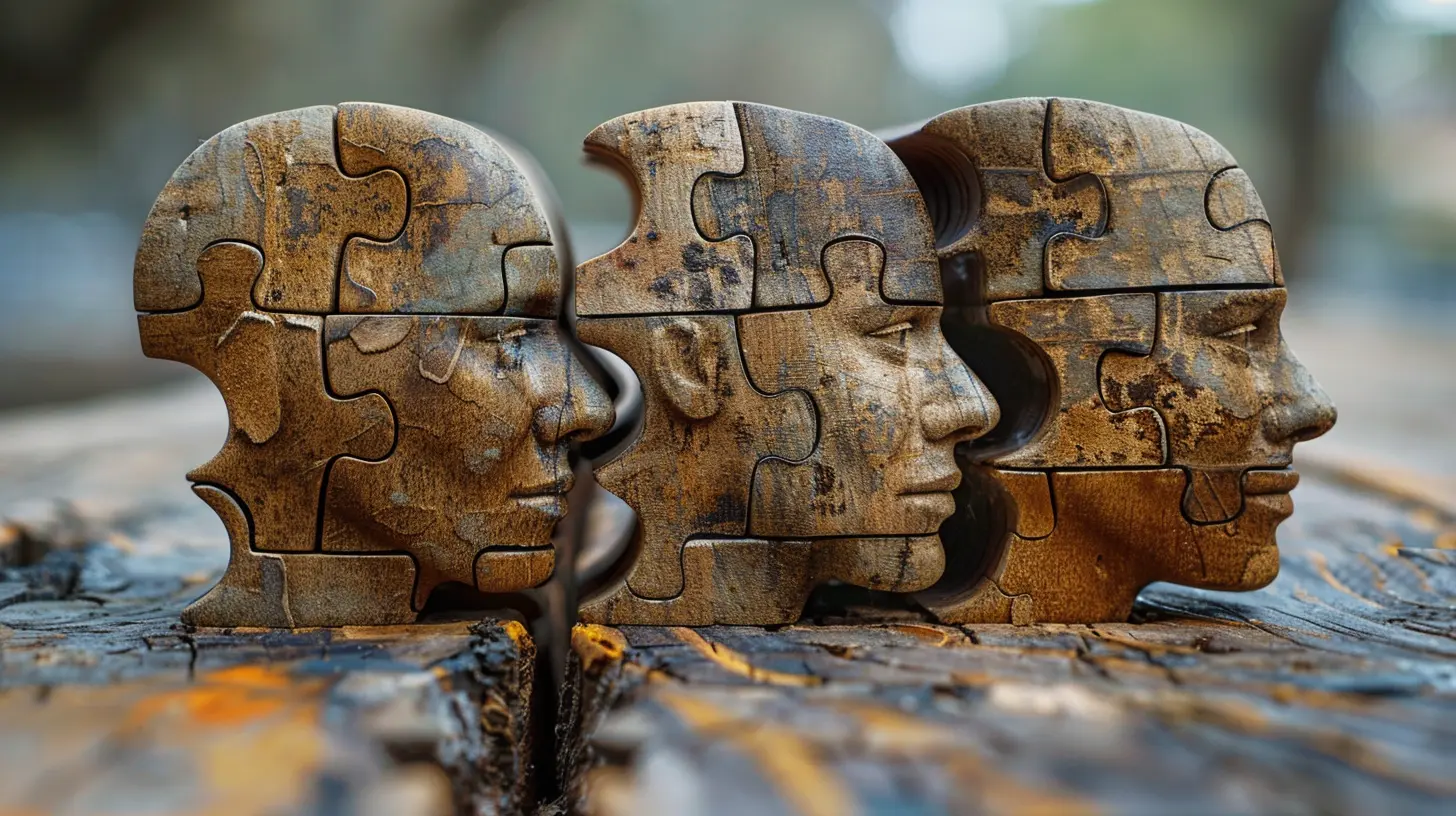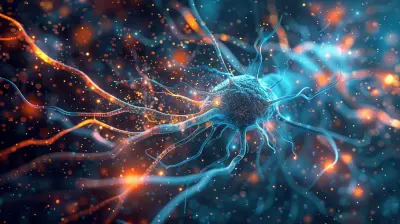Working with Parts: An Introduction to Internal Family Systems Therapy
27 February 2025
You've probably heard the term "inner conflict," right? It’s that feeling when you want two different things at once, like when you want to eat that last slice of pizza but also know you should stick to your diet. That tug-of-war, as familiar as it may seem, is a tiny glimpse into a much deeper psychological process.
Now, imagine if I told you that our mind is made up of different "parts," each with its own desires, fears, motivations, and even roles. These parts can sometimes be in harmony, but more often than not, they clash. And when they do, it can lead to anxiety, depression, or even self-destructive behaviors. This is where Internal Family Systems Therapy (IFS) steps in.
IFS offers a fascinating way to look at our inner world. It helps us understand the multiple parts we all have (yes, even you!) and how to work with them to foster healing and personal growth.
In this article, we'll dive into the world of IFS, exploring what it is, how it works, and why more and more therapists are using it.
What Is Internal Family Systems Therapy?
At its core, Internal Family Systems Therapy (IFS) is a therapeutic approach that views the mind as naturally subdivided into a collection of different parts that form a system. Each part has its own unique perspective, feelings, and roles. But don't worry, it’s not as complicated as it sounds!Think of your mind as a family. Each family member has a different role. Some members get along well, while others don't. Some are vocal, while others remain quiet in the background. But at the end of the day, they’re all part of the same system — your mind.
IFS operates on the belief that our minds are inherently healthy, but life experiences (like trauma, stress, or emotional neglect) can cause certain parts of us to become extreme in their roles. These “extreme” parts often lead to behaviors that, while protective in some way, might not be serving us in the best possible manner.
The Basic Structure of IFS
IFS breaks the mind down into three main components:1. The Self
2. Exiles
3. Protectors
Let’s unpack these one by one.
The Self: Your Inner Leader
At the heart of IFS is the concept of the Self. In IFS, the Self is you at your core — the part of you that is calm, compassionate, and curious. The Self isn't just another part of the system; it’s the leader of the system.When you're connected to your Self, you're in a place of balance and clarity. You’re able to make decisions from a grounded place, without being overwhelmed by emotions or inner conflicts. Think of the Self as the wise, compassionate leader who can listen to all the parts without judgment.
The goal of IFS therapy? To help you learn how to lead your internal system from that place of Self. Sounds empowering, doesn’t it?
Exiles: The Wounded Inner Parts
Now, let’s talk about the parts of you that might be causing the most distress: the Exiles.Exiles are the parts that carry the pain, fear, shame, or trauma from past experiences. These parts are often pushed away or "exiled" because they hold emotions that are too painful to face. But here's the thing — just because they’re exiled doesn’t mean they disappear. In fact, they can still influence our thoughts, feelings, and behaviors from the shadows.
For example, if you experienced rejection as a child, you might have an exile that carries that pain. This part of you might make you hyper-aware of rejection in your adult life, even in situations where rejection isn't actually happening. You might avoid relationships or opportunities because this wounded part is terrified of experiencing that same pain again.
Protectors: The Guardians of Your System
The Protectors are the parts of you that try to keep the Exiles from taking over. Think of them as the bodyguards of your inner world. They do everything they can to prevent those painful emotions from surfacing.There are two types of Protectors in IFS:
1. Managers
2. Firefighters
Managers
Managers are proactive. They try to control situations, emotions, and people to prevent the Exiles from being triggered. They might show up as perfectionism, people-pleasing, or even hypervigilance. Their goal? To keep everything in order so the painful feelings stay locked away.Firefighters
While Managers work preventatively, Firefighters are reactive. They jump in when an Exile's pain starts to surface. Firefighters will do anything to put out the emotional fire, even if it means engaging in destructive behaviors like substance abuse, binge eating, or self-harm. These parts aren’t bad; they’re just trying to help in the only way they know how — by numbing the pain.The Healing Process in IFS
The beauty of IFS therapy is that it doesn’t demonize any part of you. Every part, no matter how unhelpful it might seem, is trying to protect you. But sometimes these parts get stuck in old roles, and their methods of protection become outdated or extreme.So, how does healing happen in IFS?
1. Building a Relationship with Your Parts
The first step in IFS therapy is becoming aware of your parts. You might start to notice when a certain part of you takes over, like when you get defensive in an argument or procrastinate on a big project. Once you’ve identified your parts, the goal is to build a relationship with them.2. Unblending from Your Parts
In therapy, you’ll learn how to "unblend" from your parts, meaning you stop identifying with them so closely. Instead of saying, "I’m anxious," you might say, "A part of me is feeling anxious." This small shift allows you to step back and engage with your part from a place of curiosity rather than being overwhelmed by it.3. Listening to Your Parts
Once you’re unblended, you can start to listen to what your parts are trying to tell you. Why is your Manager so controlling? What is your Firefighter trying to protect you from? By listening to your parts, you can understand their fears, motivations, and needs.4. Leading from the Self
As you build trust with your parts, your Self can begin to take the lead. The Self doesn’t force any part to change or go away. Instead, it listens, provides compassion, and helps parts find new, healthier roles within the system.5. Healing the Exiles
The ultimate goal of IFS is to heal the Exiles. Once they feel safe and understood, they can release the burdens of pain and trauma they’ve been carrying. This process allows the system to rebalance, with the Self leading the way.Why Is IFS So Effective?
You might be wondering, why does IFS work so well? What makes it stand out from other therapies?1. It’s Non-Pathologizing
One of the reasons IFS is so powerful is that it doesn’t pathologize any part of you. Even the parts that engage in destructive behaviors aren’t seen as "bad" or "broken." Instead, they’re viewed as protective, albeit misguided. This approach fosters a sense of self-compassion, which is crucial for healing.2. It Encourages Self-Leadership
IFS empowers you to take the reins of your own healing. Rather than relying solely on the therapist, you learn how to navigate your internal world, build relationships with your parts, and lead from your Self. This self-leadership extends beyond therapy and into your daily life.3. It Addresses the Root of the Problem
Instead of just treating symptoms, IFS goes deep. By working directly with the parts that carry pain, fear, and trauma, it addresses the root cause of emotional distress. This leads to more lasting and meaningful change.Who Can Benefit from IFS?
IFS can be used to treat a wide range of issues, including:- Anxiety and depression
- Trauma and PTSD
- Eating disorders
- Addiction
- Relationship difficulties
But beyond treating specific diagnoses, IFS can benefit anyone who wants to better understand themselves, heal old wounds, and live a more balanced, harmonious life.
Final Thoughts: Embracing Your Inner Family
In the end, Internal Family Systems Therapy offers a refreshing perspective on the human mind. Instead of seeing ourselves as "broken" or "flawed," IFS invites us to explore our inner world with curiosity, compassion, and a sense of collaboration. By working with our parts and leading from our Self, we can heal old wounds, resolve inner conflicts, and live a more authentic, fulfilling life.So, what would it be like to get to know your inner family? Maybe it’s time to find out.
all images in this post were generated using AI tools
Category:
Therapy TechniquesAuthor:

Janet Conrad
Discussion
rate this article
8 comments
Sandra Gilbert
Insightful overview; highlights IFS's transformative therapeutic potential.
March 29, 2025 at 3:54 PM

Janet Conrad
Thank you! I'm glad you found the overview insightful and appreciate your recognition of IFS's transformative potential.
Rosalyn Frank
Unlocking the hidden voices within us reveals the secrets of our true selves.
March 17, 2025 at 5:07 PM

Janet Conrad
Thank you! I’m glad you resonated with the idea of uncovering our inner voices—it’s essential for understanding ourselves.
Emmett McIntosh
Thank you for shedding light on Internal Family Systems Therapy. Your insights into the complexity of our inner parts resonate deeply, reminding us that understanding ourselves can lead to healing and greater self-compassion. Keep sharing this vital information!
March 10, 2025 at 5:13 PM

Janet Conrad
Thank you for your kind words! I'm glad the insights on Internal Family Systems Therapy resonate with you. Understanding our inner parts is indeed essential for healing and self-compassion.
Daria McAllister
Embrace your inner parts! Internal Family Systems Therapy empowers us to understand and harmonize our diverse selves, leading to profound healing and personal growth. Let's journey together!
March 7, 2025 at 4:19 AM

Janet Conrad
Thank you for your insightful comment! I appreciate your enthusiasm for Internal Family Systems Therapy and the journey of self-discovery it promotes. Let’s continue exploring together!
Xeno Morales
This article beautifully simplifies Internal Family Systems Therapy, offering valuable insights into understanding and healing our internal parts. Thank you!
March 6, 2025 at 4:42 AM

Janet Conrad
Thank you for your kind words! I'm glad you found the article helpful in understanding Internal Family Systems Therapy.
Owen Coleman
Thank you for this insightful introduction to Internal Family Systems Therapy. The concept of understanding our inner parts offers a valuable perspective for personal growth and emotional healing. Great work!
March 3, 2025 at 5:47 AM

Janet Conrad
Thank you for your kind words! I'm glad you found the introduction helpful for your journey in personal growth and healing.
Avery Strickland
I love the concept of Internal Family Systems! It’s so relatable how we all have different “parts” of ourselves. Understanding them can really foster self-compassion and deeper healing. Thanks for this insightful introduction!
March 1, 2025 at 4:45 PM

Janet Conrad
Thank you for your thoughtful comment! I'm glad you found the introduction to Internal Family Systems relatable and insightful. Understanding our parts truly does enhance self-compassion and healing.
Courtney Williams
This article beautifully captures the essence of Internal Family Systems Therapy. Recognizing and nurturing our inner parts can lead to profound healing and self-discovery. Embrace this journey—you're taking an important step towards a more integrated self!
February 28, 2025 at 4:59 PM

Janet Conrad
Thank you for your kind words! I’m glad the article resonated with you and highlighted the transformative power of Internal Family Systems Therapy. Embracing our inner parts is indeed a vital step toward healing and integration.
MORE POSTS

The Science of Multitasking: Myths and Realities

The Science of Sleep: How Your Brain Recharges at Night

Synaptic Pruning: How the Brain Streamlines Information

The Role of Strength-Based Therapy in Building Self-Esteem

The Science Behind Dialectical Behavior Therapy for Emotional Regulation

The Impact of Childhood Attachment on Adult Romantic Choices